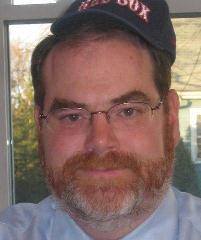- About Archives
- About SAA
- Careers
- Education
- Publications
- Advocacy
- Membership
 Professional Experience: Deputy Director, John F. Kennedy Presidential Library and Museum, Boston, MA, overseeing the Operations of the Library: Administration and Finance, Facility Management, Information Technology, Audiovisual Technical Support, Visitor Services, Special Events, and Retail Operations. 2008‒present. Head of Processing Department, Kennedy Library, 2004‒2007; Ernest Hemingway Curator, Kennedy Library 2001‒2003.
Professional Experience: Deputy Director, John F. Kennedy Presidential Library and Museum, Boston, MA, overseeing the Operations of the Library: Administration and Finance, Facility Management, Information Technology, Audiovisual Technical Support, Visitor Services, Special Events, and Retail Operations. 2008‒present. Head of Processing Department, Kennedy Library, 2004‒2007; Ernest Hemingway Curator, Kennedy Library 2001‒2003.
Education: MSLS concentration in Archives, University of North Carolina at Chapel Hill, 2001; MA in American History, University of New Hampshire, 1999; BA in History, Johnson State College, 1995.
Professional Activities: Society of American Archivists: Archives Management Roundtable, 2009‒present; Awards Committee, Coker Subcommittee, 2008‒2009, Colonial Dames of America and Donna Cutts Scholarship Subcommittee, 2003‒2005, chair 2005; Description Section, 2004‒present, Vice Chair, 2007‒2008, Chair, 2008‒2009; Diversity Committee ex officio, 2008‒2009, Dues Increase Communications Plan Task Force (2007‒2008); Education Committee, 2010‒2012; Encoded Archival Description (EAD) Roundtable, 2009‒present; Manuscript Repositories Section, 2001‒present; Membership Committee, Key Contact for Eastern Massachusetts (2003‒2005), District 1 Representative, 2005‒2007, Vice Chair, 2007‒2008, Chair 2008‒2009, Mentoring Subcommittee Co‒chair, 2009‒2010; Metadata and Digital Object Roundtable, 2010‒present; Native American Protocols Forum Working Group, 2008‒2009; SAA Session: “The Next R/Evolution: Issues and Lessons from Mass Digitization of Archival Collections,” San Francisco, 2008; Technical Subcommittee on Descriptive Standards (TSDS) Ex Officio, 2008‒2009; Theodore Calvin Pease Award recipient, 2001; Workshop Instructor: “Understanding Archives: An Introduction to Principles and Practices,” 2006‒present. AMIA: member, 2009‒present. New England Archivists: member, 2001‒present, NEA Education Committee, 2001‒2007, NEA Local Arrangements Committee, Spring 2009, Fall 2009. Misc.: Adjunct Faculty, LIS 438‒Introduction to Archival Methods and Services, Simmons Graduate School of Information Library Science, Simmons College, 2007‒present; “Building and Sustaining Partnerships: Access to a Legacy,” AASLH Presidential Sites and Libraries Conference, Charlottesville, VA, 2010; “Ask Not What Your Presidential Library Can Do for You: Public and Educational Programs with the New Frontier Spirit,” National Council on Public History, Providence RI, 2009; “Primarily Teaching: Original Documents and Classroom Strategies” National Archives Northeast Region-Boston in Waltham MA, 2007; Workshop “Caring for Historical Records,” New England Archivists, Boston College, Spring 2006; Schlesinger Library, Spring 2009; UMASS Amherst, Spring 2010; Workshop “From the Attic to the Box: Basic Arrangement and Description” New Hampshire Archives Group, Spring Conference 2005, Concord, NH May 10, 2005.
* * *
Question posed by the Nominating Committee: What actions should the treasurer take to ensure that SAA remains fiscally strong and solvent while pursuing its strategic priorities and responding to opportunities and proposals that may exist outside of the strategic priorities?
SAA is a vibrant, diverse (yes, I said it), and committed group of professionals who deeply care about our Society. Can we be more vibrant, diverse and committed? Yes but only by leading and challenging our members to seek new ideas, improve our processes to meet our goals, and be flexible when new challenges inevitably arise.
SAA’s Treasurer must first and foremost be fiscally responsible and take an active leadership role, not only as chair of the Finance Committee, but in the articulation of the Society’s strategic priorities. SAA’s Treasure must seek a balance when planning and formulating financial policy, understand the Society’s investment strategy and follow through on setting realistic goals, and monitor investments and the annual budget.
The treasurer must research the financial implications of proposals to determine risks, gains and overall impact to the Society to ensure long term financial stability of the organization. This is a challenge for us all and one I work with on a daily basis. It is too easy in difficult financial times to become risk averse at the cost of innovation. Technology is one of our strategic priorities and is usually associated with high costs. The Treasurer needs to understand how a financial commitment in technology, while initially substantial, can save money and other resources long term.
One of SAA’s most valuable investments is its members. We need to continually analyze our programs to determine whether they are relevant to our members and can be financially sustainable. Along with other Council members, the treasurer must be willing to make hard decisions concerning programs and offerings in order to remain fiscally sound.
Through my current and past positions, I have gained knowledge running an archival institution, overseeing budgets, managing facility, security, and administrative issues, and managing staff. I work in a public/private partnership and understand how to delicately navigate the needs of both institutions, working to provide funding, writing grants, and overall program management issues. From this experience, I believe SAA’s treasurer must be willing to seek new ideas for revenue to support an increasing demand for membership services.
The treasurer, along with Council, must commit resources to further the strategic priority of advocacy and public awareness of archives, archivists, and the archival profession. As a public servant, educator, and archivist, I am committed to SAA’s goal to increase the profession’s visibility through advocacy and public awareness. With this awareness, we can increase not only use of our holdings to better inform our citizenry, but better communicate our needs as professionals to improve our work and further realize the importance of archives within our society.